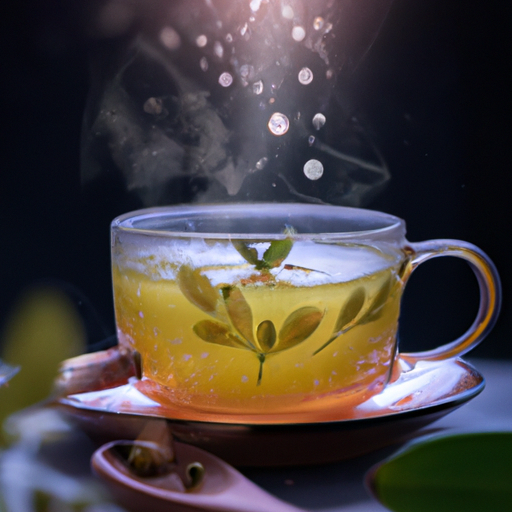As I sat sipping my steaming cup of tea, I couldn’t help but marvel at the vibrant golden hue and exotic aroma that wafted up from my mug. Turmeric tea had become my latest obsession, and for good reason.
This ancient spice, known for its culinary and medicinal properties, has been capturing the attention of health enthusiasts all over the world.
Imagine if there was a secret ingredient that could transform your ordinary cup of tea into a powerhouse of health benefits. Well, look no further than turmeric. This little yellow root, often hailed as the ‘golden spice of life,’ has been used for centuries in Ayurvedic medicine for its anti-inflammatory, antioxidant, and immune-boosting properties.
But does turmeric really belong in your tea? Can it truly enhance the flavor and offer additional health benefits? In this article, we will explore the origins and uses of turmeric, delve into the potential health benefits, and discuss how to incorporate this magical spice into your tea.
So grab your favorite mug and join me on this journey to discover if turmeric truly is good for tea.
Key Takeaways
- Turmeric tea is gaining popularity due to its vibrant color, unique flavor, and potential health benefits.
- Turmeric has anti-inflammatory and antioxidant properties, thanks to its active compound curcumin.
- Turmeric tea may help reduce the risk of chronic diseases such as heart disease, cancer, and Alzheimer’s.
- It’s important to consult with a healthcare professional before adding turmeric to tea, especially if there are concerns or if you are taking certain medications.
The Origins and Uses of Turmeric
Turmeric, with its vibrant yellow color and rich history that dates back thousands of years, has been cherished for its medicinal properties and culinary uses. This ancient spice is derived from the rhizomes of the Curcuma longa plant, which is native to Southeast Asia.
India is the largest producer of turmeric, accounting for nearly 80% of the global supply. Turmeric cultivation requires a warm and humid climate, making it ideal for countries like India, China, and Indonesia.
In addition to its culinary uses, turmeric has long been revered for its medicinal properties. The active compound in turmeric, called curcumin, has been found to possess anti-inflammatory, antioxidant, and anticancer properties. It has been used in traditional Ayurvedic medicine to treat a variety of ailments, including digestive issues, arthritis, and skin conditions.
With its long history and numerous health benefits, turmeric has become a popular ingredient in teas, drinks, and supplements. Now that we understand the origins and medicinal properties of turmeric, let’s explore the specific health benefits it offers.
The Health Benefits of Turmeric
One cannot underestimate the positive impacts that incorporating this golden ingredient into our daily routine can have on our well-being. Turmeric supplements have gained popularity due to their potential health benefits.
Studies have shown that curcumin, the active compound in turmeric, possesses anti-inflammatory and antioxidant properties that may help reduce the risk of chronic diseases such as heart disease, cancer, and Alzheimer’s. Additionally, turmeric has been used for centuries in traditional medicine for its potential to improve digestion, boost immunity, and promote healthy skin.
To reap the benefits of turmeric, one can try incorporating it into various recipes, such as turmeric lattes or curries. These not only add flavor but also provide an easy way to consume this powerful ingredient.
In the next section, we will explore how turmeric and tea make a perfect combination for overall health and wellness.
Turmeric and Tea: A Perfect Combination
To enhance your well-being, consider incorporating the golden spice with a cup of your favorite hot beverage. Research shows that combining these two ingredients can increase the absorption of beneficial compounds by up to 2000%. Turmeric is not only a popular spice in cooking, but it’s also gaining recognition for its potential health benefits.
One way to enjoy the benefits of turmeric is by adding it to your tea. Turmeric tea, also known as turmeric latte, is a delicious and soothing drink that can be enjoyed any time of the day. There are various turmeric tea recipes available that can be tailored to your taste preferences.
In the next section, I’ll discuss how to incorporate turmeric into your tea and provide some simple yet flavorful ideas. So, let’s dive into the world of turmeric-infused teas!
How to Incorporate Turmeric into Your Tea
If you’re looking to spice up your daily cuppa, there are countless ways to infuse your tea with the golden goodness of turmeric. One popular option is to try different turmeric tea recipes. You can simply add a teaspoon of ground turmeric to your favorite tea blend or create a turmeric ginger tea by combining turmeric, ginger, and honey.
Another option is to make a turmeric latte, which is a delicious alternative to traditional tea. Just mix turmeric powder, milk, honey, and a pinch of cinnamon for a soothing and flavorful beverage. It’s important to note that while turmeric has many potential health benefits, it may also have some side effects and precautions to be aware of.
Transitioning into the subsequent section about potential side effects and precautions, it’s crucial to consider these factors before incorporating turmeric into your daily routine.
Potential Side Effects and Precautions
Before diving headfirst into the world of turmeric-infused beverages, it’s crucial to be aware of the potential side effects and precautions that come along with incorporating this golden spice into your routine.
While turmeric is generally safe for most people when consumed in moderate amounts, it’s important to exercise caution if you’re taking certain medications. Turmeric may interact with blood-thinning medications, such as warfarin, and increase the risk of bleeding.
Additionally, turmeric may interfere with the absorption of iron, so individuals with iron deficiency should be mindful of their intake. Pregnant women should also exercise caution as turmeric may stimulate the uterus and potentially lead to complications.
It’s always a good idea to consult with a healthcare professional before adding turmeric to your tea if you have any concerns.
With these precautions in mind, let’s now explore the verdict: is turmeric good for tea?
The Verdict: Is Turmeric Good for Tea?
After discussing the potential side effects and precautions of consuming turmeric, it’s time to answer the burning question: is turmeric good for tea? The answer is a resounding yes!
Turmeric tea has gained popularity not only for its vibrant color and unique flavor, but also for its potential health benefits. In fact, there are numerous turmeric tea recipes available that you can easily make at home.
One of the main reasons why turmeric is considered good for tea is its positive effect on digestion. Turmeric has been shown to help reduce symptoms of indigestion and promote a healthy gut. So, if you’re looking for a delicious and natural way to support your digestive health, turmeric tea is definitely worth a try.
Now, let’s dive into some final thoughts and recommendations on incorporating turmeric into your daily routine.
Final Thoughts and Recommendations
Now, let me share some closing thoughts and suggestions to help you embrace the amazing benefits of turmeric in your daily routine.
When it comes to turmeric in tea, it’s important to consider the dosage. While adding a pinch or two of turmeric to your tea can provide some potential health benefits, it’s recommended to consult with a healthcare professional or a registered dietitian to determine the appropriate dosage for your individual needs.
Additionally, it’s worth exploring alternative uses for turmeric beyond tea. Turmeric can be incorporated into various dishes, such as curries, stir-fries, and smoothies, to add flavor and reap its potential health benefits. Experimenting with different recipes and exploring other ways to incorporate turmeric into your diet can be a great way to enjoy its goodness.
Frequently Asked Questions
Can turmeric be used in different types of tea?
Yes, turmeric can be used in different types of tea. It can be added to a turmeric latte for a delicious and healthy drink, or incorporated into smoothies for a daily dose of its many benefits.
What are some alternative ways to consume turmeric besides adding it to tea?
There are many alternative turmeric recipes to explore, such as turmeric lattes, smoothies, and golden milk. Additionally, turmeric supplements offer various health benefits, including reduced inflammation and improved digestion.
Are there any specific types of tea that pair best with turmeric?
Certain types of tea, such as ginger or green tea, pair well with turmeric due to their complementary flavors. Additionally, these teas can enhance the benefits of turmeric in herbal teas, such as anti-inflammatory and antioxidant properties.
How long does it take to see the health benefits of turmeric in tea?
It usually takes a few weeks of regular consumption of turmeric tea to start seeing the health benefits. Some of the benefits include reduced inflammation, improved digestion, and enhanced immune function.
Can turmeric tea help with weight loss?
Yes, turmeric tea can help with weight loss. Studies suggest that it boosts metabolism and aids in appetite control. Including turmeric tea in a balanced diet and active lifestyle may support weight management goals.
Conclusion
After delving deep into the world of turmeric and its potential benefits when added to tea, I can confidently say that turmeric is a valuable addition to any tea lover’s routine. Like the harmony of a dance, the combination of turmeric and tea creates a beautiful symphony of flavors and health benefits.
However, as with any ingredient, caution is necessary. It’s important to be mindful of potential side effects and consult with a healthcare professional if needed. So go ahead, let turmeric be the enchanting partner to your tea, and enjoy the journey towards a healthier you.










